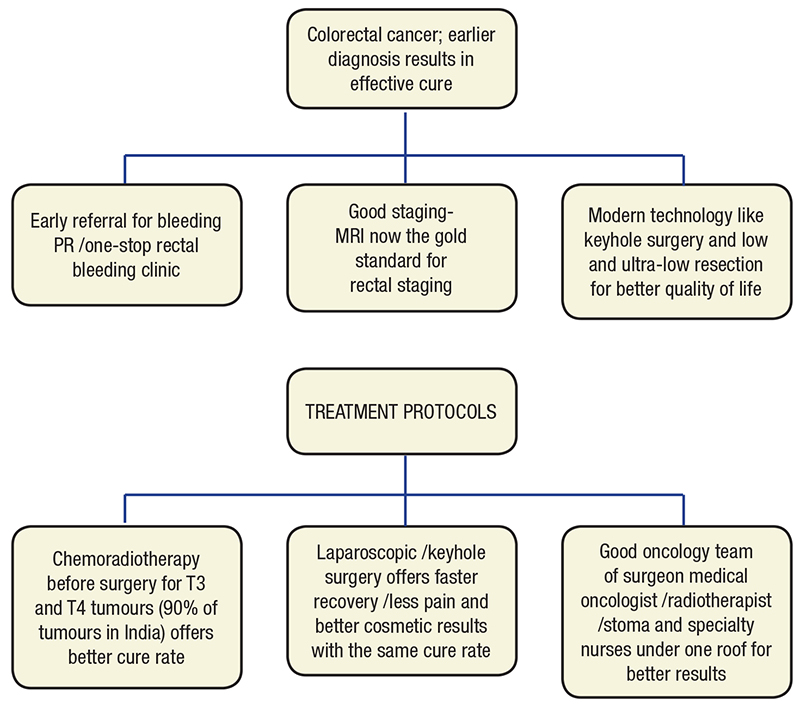Colorectal cancer is on the rise in India, and is perhaps a reflection of the changes in our diet and lifestyle. The incidence of rectal cancer is higher compared to that of the colon. Traditionally, rectal cancer has been treated by an abdominoperineal resection, which results in removal of the anus and the anal sphincter, further resulting in a permanent colostomy. A stoma (bag) is still a taboo for most Indian patients and it is therefore important to offer them the latest technology and advances in medical science to help minimise the incidence of a stoma, should one be inevitable.
15% The rise in survival with neoadjuvant chemoradiotherapy followed by surgery
Sphincter preserving surgery is now the gold standard for low rectal cancer. Traditionally, tumours within 6-8 cm from the anal verge were treated with removal of the back passage (abdominoperineal resection). However, with modern staplers and intersphincteric dissection, cancers up to 2 cm from the verge can be treated by reanastomosing the bowel, thereby avoiding
a stoma. It’s thought that using staplers may be expensive, which many low-income patients can’t afford. But the cost of having a stoma is higher in the long run as compared to one-time expense of a stapler.

Neoadjuvant treatment—pre-operative treatment with radiation and chemotherapy—is now the standard of care for stage T3 and T4 (confi rmed with MRI) rectal cancer, which is the most common of all types of colorectal cancer in India. With this, the survival chances of the patient improve much more (by about 15 per cent) as compared to cases where surgery has been the primary modality. The chances of saving the sphincter are also improved by preoperative neoadjuvant chemoradiotherapy.
Patients with low rectal cancer will need to undergo low or ultra-low anterior resection in order to save their sphincter function. This is technically more challenging and should be undertaken by a specially trained and dedicated colorectal surgeon. Most colonic resections for cancer or other causes can now be done laparoscopically using keyhole incisions. This modality offers the dual benefi t of avoiding a stoma and of a quicker and less painful recovery.
At Kokilaben Dhirubhai Ambani Hospital, we have the expertise and the facilities to provide all the above options and can decide the most suitable option for individual patients based on their clinical situation.
Managing colorectal cancer
- Stoma
is still a taboo for most Indian patients and it is important that they are offered the latest technology and advances in medical science to minimise impact. - Neoadjuvant chemoradiotherapy followed by surgery:
The survival chances of the patient improve by about 15 per cent as compared to primary surgery. The chances of saving the sphincter also improve. - Low and ultra-low anterior resection
should be offered to patients with low rectal cancer, but is technically more challenging. It should be ideally performed by a colorectal surgeon trained in these techniques. - Patient awareness and guidance
by family, physicians and gastroenterologists will go a long way in providing better quality of life to patients suffering from rectal cancer.
 Back to Site
Back to Site